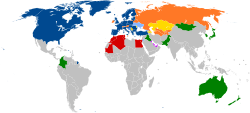This article needs additional citations for verification .(August 2014) |
You can help expand this article with text translated from the corresponding article in Romanian. (May 2023)Click [show] for important translation instructions.
|
 | |
NATO | Romania |
|---|---|
Romania joined the North Atlantic Treaty Organization (NATO) on March 29, 2004, following the decision taken at the Prague Summit, in November 2002. For Romania, this has represented a major evolution, with decisive influence upon the foreign and domestic policy of Romania.[ not verified in body ] NATO membership represents the guarantee of security and external stability, which is vital for ensuring the prosperous development of the country. Romania is playing an active role in promoting the values and objectives of the Alliance, by both participating in the operations and missions of the Alliance and involving in its conceptual initiatives and evolutions.[ not verified in body ]

